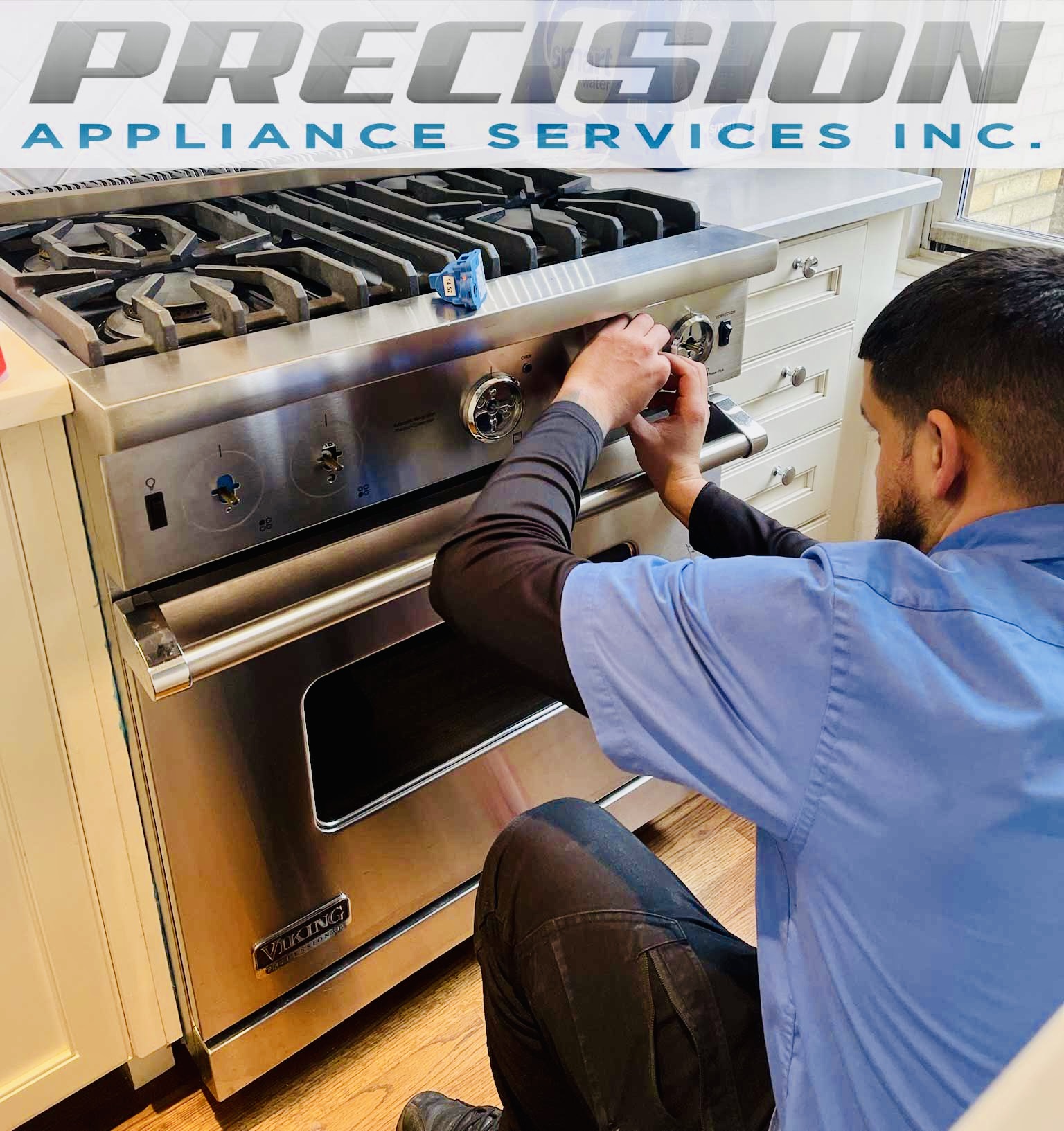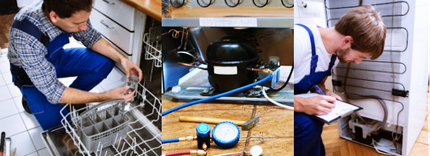How to Handle a Washer That Stops Draining – Dependable Refrigeration & Appliance Repair Service Washing Machine Repair
How to Handle a Washer That Stops Draining – Dependable Refrigeration & Appliance Repair Service Washing Machine Repair
Blog Article
The Ultimate Guide to Recognizing Device Fixing at Home
When your fridge quits cooling down or your oven rejects to heat, it can feel frustrating. Understanding device repair service at home can save you time and money. You'll discover to acknowledge symptoms, utilize crucial devices, and follow an organized troubleshooting procedure. Before you begin, there are critical safety and security precautions you require to take into account. What are one of the most typical issues, and just how can you repair them? Let's explore the essentials.
Typical Device Problems and Their Symptoms
When your home appliances begin breaking down, it's important to acknowledge the signs at an early stage. Disregarding them can lead to bigger concerns and pricey repair services. As an example, if your fridge isn't cooling down properly, you could discover cozy spots or condensation developing. This can show a falling short compressor or an obstructed vent.Your dish washer may show issues through unclean dishes or unusual sounds throughout cycles. If you hear grinding or clanking, it's time to investigate.A washing machine that won't rotate or drain can leave you with soaked washing, suggesting a stopped up drainpipe or a malfunctioning pump.Lastly, if your oven's temperature level seems off or it takes for life to preheat, you may be taking care of a malfunctioning thermostat. By staying alert to these signs, you can resolve problems before they intensify into major fixings.
Vital Tools for Home Appliance Repair
When you're tackling appliance repair work in your home, having the right tools is essential. Standard hand devices like screwdrivers and pliers will assist you disassemble and fix various devices, while electrical screening tools assure you're working securely with circuitry. Allow's review what you need to obtain started on your repair trip.
Standard Hand Devices
Having the right devices is crucial for effective device fixing in your home. Beginning with a dependable screwdriver set, including both flathead and Phillips types, as screws are common in home appliance setting up. Pliers are likewise essential; they assist with gripping, twisting, and reducing cables or small parts. A set of needle-nose pliers can get to difficult situations quickly. You'll require a good flexible wrench for tightening or loosening nuts and bolts. An utility blade comes in handy for cutting through packaging or insulation. Finally, do not forget a durable workbench or surface area to securely arrange your devices and parts. With these basic hand devices, you'll be well-prepared to tackle most device repair services that come your method.
Electrical Screening Tools
Alongside basic hand tools, electrical testing gadgets play an important function in appliance repair work. These devices assist you diagnose electrical problems and guarantee home appliances operate securely. A multimeter is vital; it determines voltage, existing, and resistance, allowing you to pinpoint issues rapidly. A non-contact voltage tester is another essential, allowing you spot live cables without making straight contact, enhancing your security. Secure meters are terrific for determining present circulation in cords without disconnecting them, saving you effort and time. Furthermore, circuit testers can swiftly examine if outlets are operating appropriately. By utilizing these tools, you'll streamline your troubleshooting process and boost your repair work skills, making device maintenance a whole lot simpler.
Step-by-Step Guide to Diagnosing Device Issues
When your appliance acts up, it can be irritating, yet detecting the problem doesn't have to be overwhelming. You'll find out to determine usual troubles and use reliable fixing methods. Allow's go through the actions to get your appliance back in functioning order.
Typical Device Troubles

Troubleshooting Methods Clarified

Repairing Significant Kitchen Area Devices: A Closer Look
Have you ever before asked yourself how to take on typical concerns with your cooking area home appliances? Repairing significant kitchen appliances like refrigerators, stoves, and dishwashing machines can be simpler than you assume. Beginning by recognizing the issue-- whether it's a fridge not cooling or an oven that won't heat up. Typically, a straightforward reset or examining the power resource can fix the issue.For refrigerators, tidy the condenser coils and check the door seals. If your stove's not heating, evaluate the burner and thermostat. Dishwashers could just require a tidy filter or a reset to obtain them back in activity. Always disconnect the device prior to diving right into fixings to assure your safety.Don' t fail to remember to seek advice from the customer manual for specific fixing tips connected to your model. With a bit of patience and the right devices, you can with confidence take on home appliance repair work and save cash at the same time!

Troubleshooting Washing Appliances: Tips and Techniques
When your washing devices start breaking down, it can feel frustrating, however repairing them does not have to be a hassle. Start by examining the power supply. Confirm the appliance is connected in and the outlet is working. Next off, examine the door or cover switch; a faulty button can avoid the maker from operating.For washing machines, if it's not spinning, look for out of balance lots. Redistributing the clothing may address the problem. If your clothes dryer isn't home heating, clean the dust filter and inspect the air vent for blockages.Listen for uncommon sounds; they can indicate a problem. If your home appliance is leaking, inspect the tubes for cracks or loose links. Paper any kind of mistake codes displayed on digital displays, as they can guide you in identifying the issue. Lastly, speak with the customer handbook for specific fixing tips associated with your Homepage model.
Security Preventative Measures to Take Throughout Repairs
Before you start any kind of device repair work, it's important to focus on safety to stop mishaps or injuries. First, unplug the appliance or transform off the circuit breaker to ensure no power reaches it while you work. Usage shielded devices to lessen the danger of electrical shock. Use safety goggles and gloves to safeguard yourself from sharp sides or debris (Dependable Refrigeration & Appliance Repair Service Washer repair near me).Make specific your office is clean and well-lit, so you can see what you're doing. Maintain youngsters and family pets away from the location to prevent interruptions and potential dangers. If you're handling gas home appliances, be extra mindful; check for leakages before proceeding.Take your time, and don't rush with repairs. If you feel uncertain concerning any type of action, it's better to stop briefly and research study than to think. Adhering to these safety measures will certainly help produce a safer environment for your DIY device repair work task
When to Call an Expert for Aid
How do you understand if it's time to call in a specialist for home appliance repairs? If you've tried basic troubleshooting without success, it's a clear sign. As an example, if your appliance still won't start or reveals unusual sounds after resetting it, don't be reluctant to look for specialist help.When you notice leakages, smoke, or burning smells, prioritize security and call a pro instantly. These issues can cause more substantial damages or posture risks to your home.Also, if your device is under service warranty, calling an expert is usually the best route. They can assure that repairs won't invalidate your warranty, saving you cash in the lengthy run.Finally, if you're not sure or unpleasant with complicated repair work, it's a good idea to leave it to the experts. Remember, taking on difficult concerns without the best knowledge can result in costly mistakes. Trust fund a specialist when doubtful!
Frequently Asked Inquiries
Exactly How Can I Avoid Home Appliance Problems in the Future?
To stop appliance troubles in the future, you need to do regular upkeep, check for damage, tidy filters, and prevent overloading. Remaining proactive will help expand their life expectancy and maintain them running smoothly.
What Are the Most Common Do It Yourself Home Appliance Repair Work Mistakes?
You could forget safety preventative measures, miss fixing steps, or utilize wrong devices when trying do it yourself device repair work. Rushing the procedure or ignoring producer standards can result in even more significant problems and expensive blunders. lg repair Remain person and notified!
Exactly how Do I Know if a Component Demands Substitute?
You can inform if a part requires replacement by looking for unusual sounds, leakages, or irregular performance. If the device struggles to operate appropriately or reveals noticeable damages, it's most likely time for a replacement.
Can I Make Use Of Generic Parts for Home Appliance Services?
Yes, you can utilize generic components for appliance repair work, yet establish they work - Washer dryer repair service Dependable Refrigeration. Generic parts may save you money, steel city appliance repair but they can influence efficiency or long life, so consider your options thoroughly before deciding
What Guarantees Cover Home Appliance Repair Works?
A lot of device warranties cover repair services for producing problems, but they usually exclude damages from misuse. Check your service warranty terms carefully, as some could call for making use of qualified professionals and original parts for insurance coverage to remain valid.
Report this page